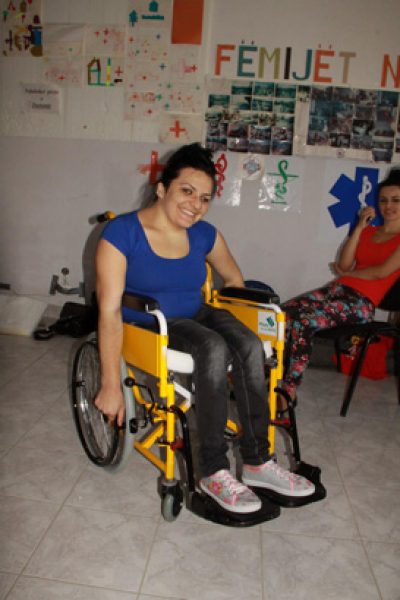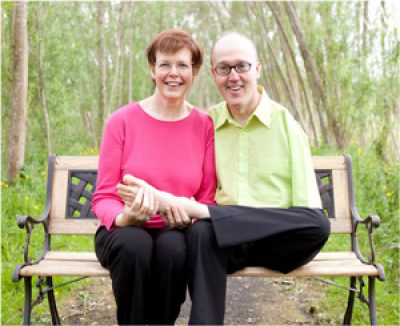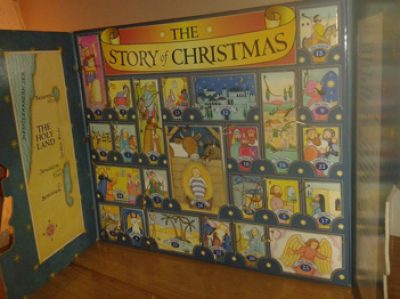Do Three Good Deeds in One

How about doing 3 good deeds in one?
Follow this link to visit our mini-site for the 3 in 1 Good Deeds Appeal
The good deed is to give £40 to our Wheels for the World project. This could fit with saving £1 a day for 40 days of Lent. Through the Roof will then use your donation to do three good deeds through..
Step 1: Reclaimed
Saving an old wheelchair from landfill, and taking it on to a second life.
Step 2: Refurbished
Helping a prisoner to make a meaningful contribution to society, giving those in Parkhurst prison workshop the opportunity of refurbishing wheelchairs to ‘as-new’ standard (sometimes even better!)
Step 3: Result
Changing the life of a disabled person - giving the gift of a wheelchair or mobility aid and a Bible to someone in a developing country.
Visit <a title="Follow this link to visit our mini-site for the 3 in 1 Good Deeds Appeal" href="http://3in1gooddeeds.org/">3 in 1 Good Deeds</a>. Your support changes lives!
'Stop, Look, and Listen' - Our February 2015 Come Fishing

Here's the latest episode of 'Come Fishing', from Jenny Edwards MBE. Each episode contains news, stories, music, and inspiration. We hope you enjoy it!
- Follow this link to download February's Come Fishing Podcast.
- Follow this link to visit our Podcast page on iTunes, and subscribe to receive it as soon as it's released
Gault News Travels Fast

‘Look, No Hands’ author and prolific Wheels supporter, Brian Gault, is making a visit to the South-East of England for a short fundraising and speaking tour in March. Brian is one of 456 UK survivors of the Thalidomide disaster in the 1960s, and now writes and speaks about his experiences of living without arms, and how, with God’s help, he’s achieved so much, and dedicated his life to helping others.
Brian, who lives in Northern Ireland, will arrive in Epsom on Wednesday 11th March, and has a full itinerary of speaking engagements at schools, groups and churches. Including two main events, one on Saturday 14th March at 7.30 pm for An Evening with Brian Gault at The King’s Centre, Chessington (KT9 2GZ), and one on the evening of Sunday 15th at 6.30 pm, when he’ll be talking at Morden Park Baptist Church (SM4 4SP).
Brian is a great speaker, and we’re sure it’ll be an inspiring and moving week, with plenty of opportunities to find out more the work of the charity.
There's a great interview with Brian here: Follow this link to read an interview with Brian.
Brian will be heading back home on the 16th March, but if you're unable to get to either of the big events, please get in touch with us on info@throughtheroof.org and we'll advise you on any smaller events happening near you.
Saturday 14 March
7.30 - 9.00pm Main event: “An inspirational evening with Brian Gault” – at The King’s Centre, Chessington KT9 2GZ. www.thekingscentre.org.uk
Sunday 15 March
6.30 pm - Talk at Morden Park Baptist Church www.mpbc.org.uk Lower Morden Lane, Morden SM4 4SP
The Night That Changed My Life (Ros' Blog)

This week’s blog post is written by Mandy Edwards, who shares with us something of her own journey with God through disability.
The night that changed my life
Finally at the grand old age of 52 I’ve started reading my Bible whenever I feel overwhelmed, which is pretty much most of the time. No, I’m not a new Christian. In fact up to this point I would have called myself a believer for about 30 years. Yet I seemed to have spent my life like a Christian washing machine of despair, with all my faults and failings swirling around in my mind like washing with indelible stains. Even when I changed my clothes the stains seemed to haunt me. I could see them and was convinced others did too. I felt inadequate as a person and nothing anyone said seemed to change that view.
I’ve made mistakes (BIG ones) during my life time, accelerated by the death of my dad, brother and grandparents when I was 14 (but that’s another story). Right now my biggest problem was that my faith just didn’t seem durable enough. Everyone else seemed more joyful than me, more proactive than me and that’s not even touching on their professional life. Strictly speaking, as a Christian, I knew that money shouldn’t be important, but it was hard living on disability benefits, especially after losing my career as a teacher. Yes I wasn’t exactly a JC superstar was I? In fact few people know about me, least of all as an advocate for JC. When I felt low I’d get angry and my tongue became like a runaway train. Not exactly experiencing inner peace.
Something changed today. It started, as often, with another bad night; waking up in chronic spinal pain every couple of hours. Hot water bottles eased the situation a bit but then I tossed and turned. Hot. Cold. Hot. Cold. I stomped the halls of sleeplessness and finally gave up the ghost and got up at 4.30 to run a hot bath. It was freezing. Of course, my limited coffers meant I’d allowed myself hot water between the hours of 8am-9am and 6pm-7pm. In frustration I picked up my Bible and flicked it open, looking for solutions on intractable pain and freezing baths. There it was: 2 Corinthians 4. 16. No, not the solution to hot water, but it told me that “anyone in Christ is a new creation, the old has passed away”. I’ve read this a million times but somehow the drone of that washing machine of despair always seemed to drown out its implications.
So I continued to flick. Titus 2.14, Amplified Version. Jesus gave us life so we could be people who are ‘eager and enthusiastic’ about living a beneficial life. Something pinged in my head. I had spent so much of my life discouraged depressed and despondent. Then I tried to imagine how I would feel if I had willingly died a horrifically painful and humiliatingly public death for my son’s sake. I’d do it in a heartbeat because I loved him completely and utterly. Supposing he had then rejected my gift? Instead he had been swallowed up by guilt and lived a depressed and unfulfilling life. It literally physically hurt me to think of this scenario yet I did this every day to Jesus.
I thought about Paul. Paul the apostle, whose words speak to us from 2000 years ago and inspire so many Christians all over the word today. Paul had been a murderer. He had actively sought out Christians to annihilate, yet he had jumped on-board. He had accepted Jesus’ sacrifice and refused to look back in paralysing horror at his past actions. (Philippians 3. 12). He recognised that he was far from perfect. He referred to a ‘thorn in his side’ but doesn’t let it stop him.
It became clear to me: it requires a determined act of will to accept a gift you don’t deserve and be prepared to enjoy that gift fully and without guilt. A life of joy. A life of inner peace and inner power. A life where you can get everything you ask for in Jesus’ name simply by prayer. A life with a family that extends across the globe. The drone of that washing machine finally slowed and stopped at around 7am on the 4th December 2014. And I knew that the clothes would now finally be spotless, stains removed. I’m sure it may try to re-wash the stains but now I knew what I needed to visualise to turn it off. A determined and on-going act of will.
There was still one question that still haunted me. If I am really so loveable and worthy of Jesus’ sacrifice then why did God allow my suffering? My spinal accident? My bereavements? My poverty? I knew that I would never let my son suffer if I could stop it. Never. I prayed for that remaining answer as I stiffly and painfully got dressed for the day.
My son David was downstairs dashing about, preparing for college. His tee-shirt needed ironing, he had lost his shoes, he couldn’t find the car keys and he needed a packed lunch. I felt intensely irritated. How many times had I told him to get all his stuff ready the night before? How many? I opened my mouth to voice my irritation (that runaway tongue again) when suddenly I realised that the answer to my question was staring me in the face. As a parent I loved my son dearly and had tried to prepare him for life by giving him a framework to live by. Still he chose to do it the hard way, finding out for himself and often unintentionally suffering in the process. As a loving parent I found it so frustrating that he wasn’t always willing to take my advice, yet by not following bible guidelines I was myself doing exactly the same thing!
I knew that my disability was in no way caused by any fault of mine but my despair and fear had compounded my misery. The Word of God in the Bible shows us how to live a happy and fulfilling life, from treating others lovingly to embracing your professional life, however unimportant it may feel. I had chosen not to use it that way at all. I was 52 and only now realising that all the answers to life could be found by daily study and prayer. To be honest the Bible was something I listened to at church and read when I had time. I had created my own suffering as so many of us do unintentionally. Now I’m certainly not saying all suffering is man-made. That’s a question far too great for me to answer but my specific question had been answered. My pain was real, would likely be with me for the rest of my life. How I chose to deal with this has changed forever. Indeed my very disability could be used to glorify God, who often chooses to work through imperfect and insignificant people. (1 Corinthians 1.27-28) Their very limitations then clearly illustrate how it is the miraculous works of God that both shine in and work through us. I now feel able to accept the joy, the peace, the hope, the inner power and I look forward to new possibilities. All because of Jesus Christ.
Are You Excited? (Ros' Blog)

Over Christmas I have been reading and thinking about the ministry of John the Baptist, the forerunner of Jesus the Messiah. As often with the Gospel narratives, we have to fit the whole jigsaw together from the four different Gospels. Sometimes these Bible passages are so familiar that we have to picture them as though we were there in order to catch the real spirit and flavour of what happened.
John the Baptist as portrayed in the Gospels has a holy boldness that renders him fearless. He has a message which he will deliver to whoever will listen, and will baptise those who are willing to repent and amend their lives in line with his teaching. He even dares to call the religious and legal leaders of his day, “a brood of vipers”. Affronted, they send a delegation to investigate the fiery young preacher. I can picture the priests and Levites coming to ask John just exactly who he thinks he is, and, as the conversation progresses, his growing alarm at the thought that some may be mistaking him for the long-promised Messiah (much as Paul and Barnabas must have felt at Lystra when they were mistaken for gods).
John first explains to them who he is not, and then goes on to define himself in Isaiah’s words as the voice crying in the wilderness, “Prepare the way of the Lord!” So why, then, they want to know, is John baptising, if he is not the Messiah? I can imagine his face radiant and his voice fired up with excitement as he tells them of the One he knows is coming, even though he doesn’t yet know who He is: “I baptise with water, but among you stands one you do not know. He is the one who comes after me, the straps of whose sandals I am not worthy to untie.”
I see him on tiptoe, a-quiver with excitement, his eyes aglow, trying to convey to his hearers the momentousness of what God is about to do. And all this is a matter of faith, because he still has no idea who the coming one is, he just has one clue that the Holy Spirit has given him: “The man on whom you see the Spirit come down and remain is the one who will baptise with the Holy Spirit.” He doesn’t know exactly how this will look, but he knows for certain that he will recognise the moment when it comes.
And then comes a day when John looks up and sees his cousin, Jesus, coming to be baptised. John is troubled. He’s known Jesus all his life, and for a start, he can’t think of one single thing Jesus might have to repent of. But more than that, he has a sense of being in the presence of one far greater, more righteous than himself, and he looks at his cousin with a combination of curiosity and unease as he blurts out, “I need to be baptised by You, and do You come to me?” Questions fill his head, as he looks at his familiar cousin through new eyes. Things he has been told of Jesus’ history begin to fall into place. Jesus assures him, “Let it be so now; it is proper for us to do this to fulfil all righteousness.”
And so, filled with a sense of anticipation, yet not knowing exactly why, John steps down into the river Jordan and baptises his cousin. And suddenly, the sign he has been told to look out for manifests right in front of him: the Holy Spirit, in the form of a dove, descends on Jesus as He stands dripping on the river bank. And to remove any doubt that this is the One whose coming he has been sent to foretell, a voice resounds out of the heavens: “This is My Son, whom I love; with Him I am well pleased.”
And at once John understands his own reluctance to baptise Jesus. All the excitement he has felt as he has been describing the one who will baptise with the Holy Spirit and with fire now finds its realisation in the person who stands in front of him. His whole life has been building up to this moment; his faith in God has not been in vain.
Jesus goes on His way, leaving John changed forever; he has seen the Messiah, the long-awaited promise of God. The next day, as Jesus walks down towards the Jordan at Bethany, John cannot contain himself. He points to Him. “Look!” he calls to the crowd. “The Lamb of God who takes away the sin of the world.” And maybe a voice from the crowd asks him how he knows, and still with that tone of wonder John replies, “‘I saw the Spirit come down from heaven as a dove and remain on him. And I myself did not know Him, but the One who sent me to baptise with water told me, ‘The man on whom you see the Spirit come down and remain is the One who will baptise with the Holy Spirit.’ I have seen and I testify that this is God’s Chosen One.”
John’s enthusiasm must have seemed fanatical and out of place to a society that had grown weary of waiting long centuries for God’s promise. It was much more sensible to live a life of resignation than be at the mercy of hope. Hadn’t many previous generations longed to see Messiah, and died with their hopes unfulfilled? Why set yourself up for disappointment? But John refused to be conditioned by the spirit of his community. God had ignited a flame of hope inside him, which he was going to nurture and not let anything extinguish it.
We, too, live in a world that is weary and has to a large extent given up hope of seeing God come in any significant way. More than that, many of the woes of the world, the wars that cause suffering, destruction and starvation, are caused by religious fanatics who think they are espousing God’s cause. The rest of the world can be pardoned for thinking they would rather not be visited by such a God.
And yet we who know Jesus have a twin hope of His coming. We have an expectation of His ultimate return to bring justice and peace and to establish His reign and rule. And we have the hope of His promise never to leave us or forsake us. (Are we as excited about these as John was about His first coming?) Whatever circumstances we are currently facing, Jesus is certain to appear in the middle of it all! I remember being told by a preacher that an old Quaker Bible rendered James 5.8 “The coming of the Lord is at your elbow”. Do we really believe He is that close?
I love J B Phillips translation of 1 John 3.2: “Here and now we are God’s children. We don’t know what we shall become in the future. We only know that, if reality were to break through, we should reflect his likeness, for we should see him as he really is!”
Suppose the reality of Christ were to break in on you right now? I would like to encourage you, whatever your personal circumstances, no matter what difficulties or struggles you may be facing, not to lose your excitement over the ways in which Jesus is going to come to you this year. Maybe your disability is a progressive one and the symptoms are worsening. Or maybe others don’t understand its effects, and unwittingly put obstacles in your way. Jesus is coming to you! You may not yet know how that will look, or what difference it will make, but like John, you can be sure you will recognise Him when He comes. Don’t allow the general pessimism in the world around to rob you of that excitement. We have His word, the apostle Peter tells us, “made more sure, to which you do well to pay attention as to a lamp shining in a dark place”.
No one in their right mind would turn their back on the beam from a lamp and step out into the darkness; and yet I know there have been times when I’ve done exactly that, focussing on the conditions around me rather than on the promise of God. But if you keep your focus on the promise of Christ, He will illuminate all your surroundings. So whether you are starting 2015 with a pleasant prospect of good things to come, or whether the outlook is grim, pay attention to the promise of His presence, His coming in your circumstances, just as you would pay attention to the beam from a lamp shining in a dark place. Soon enough you will discern His presence and see His transformation in your life.
The picture shows excavated remains, believed to be the site of John’s baptisms.
'A Great Big God' - Our January 2015 Come Fishing

Here's the latest episode of 'Come Fishing', from Jenny Edwards MBE. Each episode contains news, stories, music, and inspiration. We hope you enjoy it!
- Follow this link to download January's Through the Roof Podcast.
- Follow this link to visit our Podcast page on iTunes, and subscribe to receive it as soon as it's released
Happy New Year

The Through the Roof office is now open for 2015! We'd like to wish you all a very happy New Year, and look forward to all the new and ongoing work to come.
Happy Christmas!

All of us at Through the Roof wish you a very happy and blessed Christmas, and would like to thank you for all of your involvement and support over the year. We'll be taking a Christmas break from Christmas Eve to Monday the 5th January, but any messages left on the phone or email will be responded to as quickly as possible once we're back. Take care, and we'll see you all in 2015!
Advent Reflections (Ros' Blog)

The approach to Christmas in our family is, as in so many other families, a time of growing excitement. Each day that the Advent book is opened, each chocolate from the Advent calendar, marks off another step nearer to the big day. Ellen loves everything about Christmas – the lights, the shopping, the carols (especially the carols), the presents. That’s to say, she loves the still-wrapped presents. She loves to take hold of them, clutch them in a moment of anticipation and then with her faltering fingers, slowly pull off the wrapping paper, by herself if she can, but sometimes defeated by the task and appealing for our help.
What happens next depends entirely on the contents of the parcel. If it contains something safe (i.e. familiar) all is well. If it contains something scary (i.e. unfamiliar) it is usually hurled across the room with a fearful cry of, “Take it back to the shop!” I’m sure it’s a scene repeated in many homes where there is a family member with autism.
Over the years we have learned how to make Ellen’s presents “safe”. It’s safe to give her CDs or DVDs as long as it’s music and films she’s already familiar with (asked what she wants for Christmas she will usually name a CD she already owns). It’s safe, and indeed very welcome, if the parcel contains chocolate, bubble bath, money, colouring books and pens, a personal stereo or dictating machine or a roll of bubble wrap that she can cut into strips and take to church on Sundays to sit and pop during the long sermon.
Stray outside these boundaries and the gift will cause stress, fear and antipathy – very embarrassing if the dear old aunt who chose it is present at the opening. The reaction can be quite extreme – given the extent of Ellen’s quadriplegic cerebral palsy, it always amazes me how she manages a bouncer that would be the envy of many an England bowler. This gesture can be accompanied not only by demands for the offending object to be taken back to the shop, but by mounting cries, screams and self-harm unless a swift promise is made to return the gift at the earliest opportunity.
Once again, as I make my preparations for Christmas, I can see a parable in Ellen’s behaviour. How often do we ask God for something, anticipating joyfully the answer to our prayer because we know how faithfully He has answered us before; but then if the answer comes in a guise we were not expecting, we reject it and refuse to allow Him to lead us into a new experience?
I am lonely and want a friend – but I’m not willing to befriend the particular person God brings across my path. I want a fresh outpouring of the Holy Spirit in my church – but if it manifests in a way that is quieter, or noisier, or in some way more unusual than my previous experience, I’m quick to join those who denounce it as not being genuinely from God. I need financial provision – but God’s response is to tell me to sow what I have in order to reap the harvest He has for me, and my fist tightens around the little I have, unwilling to make the faith experiment.
May God give us the grace to receive all His gifts, even the unexpected ones, and to allow Him to lead us in unfamiliar paths, in undreamt-of ways, into greater blessings than we could ever have imagined if left to our own devices.
This article first appeared on Ros’s personal blog at rosbunneywriting.wordpress.com.
With the Poor and Mean and Lowly Lived on Earth our Saviour Holy (Ros' Blog)

Jesus was born into a country under Roman occupation. Times were harsh for the poorest members of society – and we know that His family were poor, not only because He had to be laid in a manger but also because His parents sacrificed two doves, as was permitted for poor families, rather than the lamb which was the normal sacrifice at the birth of a child.
Within a short time of His birth He became a refugee, and only returned home once it was safe to do so. Home was an insignificant village of probably fewer than five hundred residents, which had no trade routes and was of no economic importance; poverty was a way of life for its inhabitants. Jesus grew into an adult who had 'nowhere to lay His head' and so little money that He had to trust God for a miracle when His tax was due. A very different world from the one we inhabit. Or is it?
Contact a Family has published the 2014 results of its annual 'Counting the Costs' survey, which aims to build an accurate picture of the economic circumstances of families in the UK with disabled children. Of the people who completed the survey, twenty-five percent have more than one disabled child and half say they or their partner have a disability or health condition. Twenty-eight percent are lone parents, and sixty-six percent of the households have someone in paid employment.
The survey, conducted every other year, showed that since 2012, the number of respondents going without food has almost doubled to thirty-one percent. The number going without heating has increased from twenty-one and a half percent to thirty-three percent. Of these, twenty-two percent say their child’s health has worsened as a result of going without essentials and forty-nine percent say their own health has suffered. Marriages and relationships have foundered as a result. “Going without everyday essentials” means different things for different families; most had no days out or leisure time; many had cut back on purchasing clothes and car fuel. A very significant number (more than a third) could not afford specialist equipment, therapies and hospital visits.
Sixty-five percent say that in the past twelve months they have fallen behind on energy and utility bills; thirty-six percent have taken a loan, most of them to pay for food and heating. Fifty-one percent have had threats of court action for non-payment of bills, mainly for council tax and energy bills. Unsurprisingly, ninety-three percent report anxiety and stress.
More than twenty-five percent of those surveyed reported that they incur an average of £300 of extra costs directly as a result of their child’s disability. These costs are for things like special clothes or equipment, adapted transport, and more frequent laundry and replacement of items. Eighty-eight percent have caring responsibilities that prevent them working as many hours as they want, and almost three-quarters are cutting back on work or giving up on careers because of the difficulty of finding specialist care for their disabled child. A third are worse off as a direct result of benefit changes, nearly half of them by £30 a week.
Right at the outset of His ministry, the child who had grown up in poverty stated that He had come to preach good news to the poor. He supported His words with actions, seeking out the poorest and most marginalised members of society to show them God’s love and power. He specified that poor people, as well as disabled people, were to be given pride of place at the banquets of the wealthy. In the parable of the sheep and the goats He was very specific about the way in which His followers should care for the poorest and most disadvantaged people around them.
The apostles took up His call – Paul connected giving to the poor with the example of Christ: “But just as you abound in everything, in faith and utterance and knowledge and in all earnestness and in the love we inspired in you, see that you abound in this gracious work also… For you know the grace of our Lord Jesus Christ, that though He was rich, yet for your sake He became poor, so that you through His poverty might become rich.” (2 Corinthians 8. 7-9)
James declared that religion was worthless unless it included generosity towards those who were lacking life’s essentials: “Pure and undefiled religion in the sight of our God and Father is this: to visit orphans and widows in their distress, and to keep oneself unstained by the world.” (James 1.27).
This Christmas, as we worship the one who was born into poverty, lived among poor people and challenged us to care for those around us who lack the means to meet their own needs, let us be aware of those who are raising disabled children in hardship and want, and ask God to show us what we can do to help.

